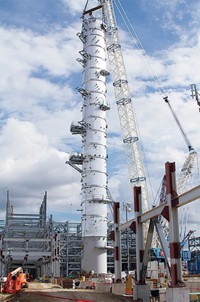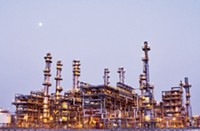Advertisement
Grab your lab coat. Let's get started
Welcome!
Welcome!
Create an account below to get 6 C&EN articles per month, receive newsletters and more - all free.
It seems this is your first time logging in online. Please enter the following information to continue.
As an ACS member you automatically get access to this site. All we need is few more details to create your reading experience.
Not you? Sign in with a different account.
Not you? Sign in with a different account.
ERROR 1
ERROR 1
ERROR 2
ERROR 2
ERROR 2
ERROR 2
ERROR 2
Password and Confirm password must match.
If you have an ACS member number, please enter it here so we can link this account to your membership. (optional)
ERROR 2
ACS values your privacy. By submitting your information, you are gaining access to C&EN and subscribing to our weekly newsletter. We use the information you provide to make your reading experience better, and we will never sell your data to third party members.
Business
Dow Advances Overseas Projects
Saudi and Chinese complexes are part of firm's overhaul of its commodity chemicals business
by Alexander H. Tullo
May 21, 2007
| A version of this story appeared in
Volume 85, Issue 21

DOW CHEMICAL is advancing two joint ventures aimed at unlocking sources of feedstocks and giving it access to developing markets.
The company has signed a memorandum of understanding for the construction of a massive joint venture with Saudi Arabian oil company Saudi Aramco near the eastern Saudi town of Ras Tanura. The partners aren't disclosing the cost of the project, but estimates of more than $20 billion have appeared in recent published reports.
Separately, Dow and Chinese coal mining company Shenhua are launching a two-year study of a plant that would make petrochemicals from coal. Slated for the central Chinese province of Shaanxi, the plant would convert coal into methanol, which in turn will be used to make ethylene, propylene, and other petrochemicals. The complex would include a chlorine unit and plants to make many other products.
Slated for completion in 2012, the Saudi project may be the largest ever undertaken in the petrochemical industry. Dow CEO Andrew N. Liveris told analysts in January that the site would become the "Freeport, Texas, of the emerging world," a reference to one of Dow's flagship chemical complexes.
The companies are planning some 30 separate plants, including an ethylene cracker and plants for polyethylene, ethylene oxide and derivatives, propylene oxide, glycol ethers, epoxy resins, polycarbonate, polyurethane, chlorine, and vinyl chloride.
The key to the complex will be "a long-term secure and reliable feedstock position," Liveris says. It will be integrated with Aramco's Ras Tanura refinery, which will supply liquid feedstocks, and Aramco's Ju'aymah natural gas processing plant, which will supply ethane.
The project is part of Liveris' strategy of reducing the cyclicality of Dow's commodity chemicals business. The company recently announced a polystyrene joint venture with Chevron Phillips. It is also developing ethylene crackers in Oman, Libya, and Thailand.
P. J. Juvekar, a chemical analyst with Citigroup, endorses the strategy but with some reservations. "We believe Dow's Middle East strategy has been brilliant so far," he wrote to clients late last month. "But too many such ethylene deals might increase the firm's overall cyclicality."






Join the conversation
Contact the reporter
Submit a Letter to the Editor for publication
Engage with us on Twitter